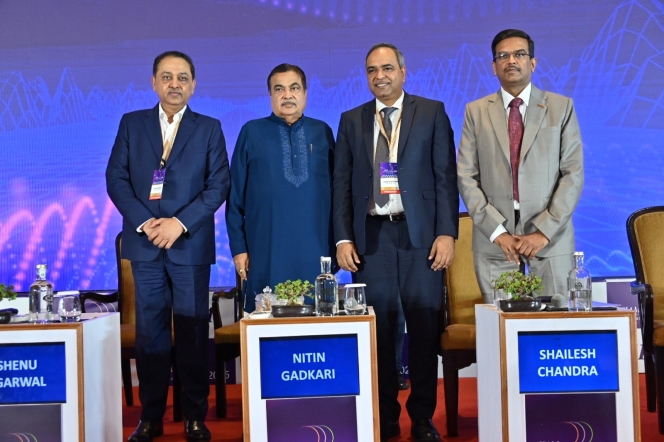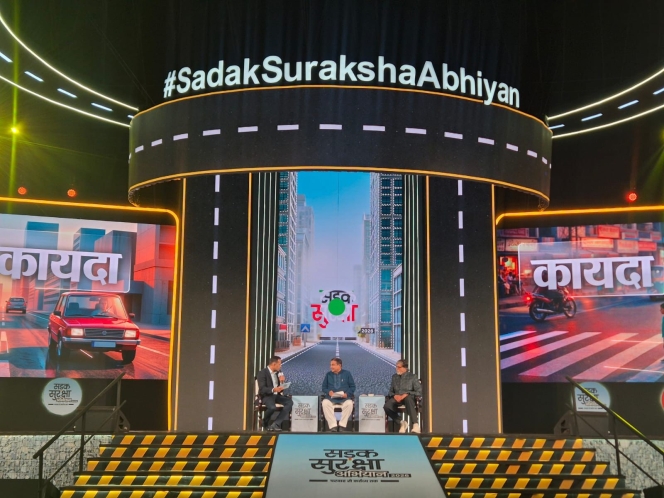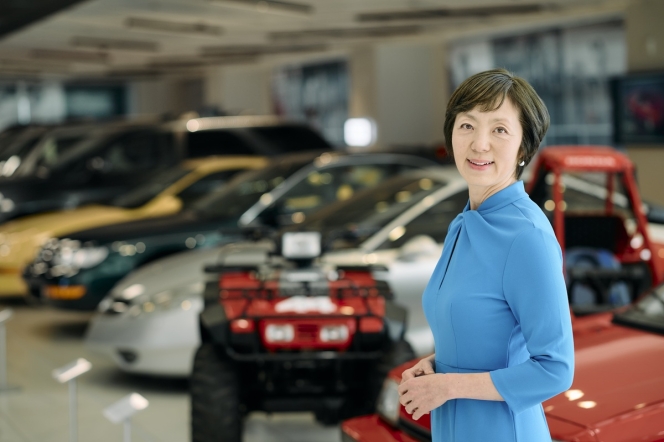India’s Auto Industry Sets Measured Course On Clean Mobility, Software And Exports At SIAM Convention
- By Biplab Das
- September 13, 2025

India’s automotive leadership used Society of Indian Automobile Manufacturers' 65th Annual Convention to signal continuity on emissions and safety policy, a pragmatic push on biofuels and electrification and a growing dependence on software-defined vehicles, while framing exports and supply-chain resilience as medium-term priorities.
Prime Minister Narendra Modi, in a special message, said India must achieve “true self-reliance across the entire automotive manufacturing value chain,” adding that “as the nation advances towards global leadership in green and smart transportation, opportunities for investment and collaboration are immense.”
Union Road Transport and Highways Minister Nitin Gadkari said, “We will maintain global alignment on BS7 and CAFE norms to address air pollution issues,” linking the shift to alternative fuels with macro-objectives: “Moving to biofuels helps in reducing India’s crude imports and enhances farmer incomes.”
He added, “For those aiding road accident victims, INR 25,000 will be awarded to Rakshaveers,” alongside ‘insurance up to 150,000 to accident victims,’ while stating that public campaigns and NGO engagement are ‘essential to improve human behaviour to prevent accidents.’
Gadkari also said logistics costs would ‘come down to single digit by year end,’ and cited scrappage progress with ‘more than 300,000 vehicles’ dismantled to date.
Industry capacity and localisation
Union Minister of Heavy Industries and Steel H. D. Kumaraswamy said the production-linked incentive scheme has drawn ‘more than INR 295 billion of capital investments,’ and that the steel ecosystem is working on ‘developing specialised steel for the auto sector to reduce its import dependence.’
Tarun Kapoor, Adviser to the Prime Minister, urged industry to partner with the Anusandhan National Research Foundation and to scale ‘biofuels, gaseous fuel and electric mobility’ and compressed biogas, while ‘working towards enhancing presence in global markets.’
Hanif Qureshi, Additional Secretary, Ministry of Heavy Industries, noted government support to the EV ecosystem since 2015, the installation of ‘8,900+ public chargers’ and ‘around 10,900 e-buses,’ and called for investments in electric heavy vehicles.
Software-defined vehicles and AI
Rajan Wadhera, Member, SCALE Committee and former SIAM President, chaired the session on software-defined vehicles, where Dr Christopher Borroni-Bird, Founder, Afreecar (USA), said, “The path to SDVs is a major disruption for automakers.”
Dr Bird clarified distinctions between connected vehicles and fully software-defined platforms and noting rising software share in value.
A technology leader argued, “Generative AI is not simply another tool; it is a strategic enabler that is fundamentally shaping the Indian automotive sector, while acknowledging enterprise deployments are still early.”
Andreas Tschiesner, Senior Partner, McKinsey & Company, projected that “in 2035, we expect 30 percent of all produced vehicles will be built on zonal EE architectures, with cloud-managed development, AI-powered coding and virtual twins accelerating programmes.”
Exports, FTAs and supply chains
Rajesh Agrawal, Special Secretary, Ministry of Commerce and Industry, said, “India is now increasingly looking at integrating more with the world.”
He added, “We believe the next phase of growth, beyond a 4 trillion economy, will come through exporting to international markets and noting that India has signed FTAs with 27 countries.”
Sudhakar Dalela, Secretary (Economic Relations), Ministry of External Affairs, said, “the domestic market is robust but it is equally important for the auto industry to strengthen exports and diversify its supply chain, integrating into the global markets and value chains.”
SIAM President Shailesh Chandra, who is also MD of Tata Motors Passenger Vehicles and TPEM, pointed to ‘a record 5 million vehicles exported’ and called a recent UK FTA ‘a landmark,’ describing 20 percent export growth as ‘a powerful vote of confidence.’
OEM perspectives and next steps
Shenu Agarwal, Vice President, SIAM, and MD & CEO, Ashok Leyland, said commercial vehicles remain ‘pivotal for sustainable mobility,’ backing CNG and LNG in long-haul and ‘deep localisation of electric mobility.’
K. N. Radhakrishnan, Director & CEO, TVS Motor Company, highlighted ‘strong R&D momentum,’ progress on the circular economy and the need to ‘focus on developing local talent,’ adding, ‘The customer should remain at the centre of all decision making.’
Unsoo Kim, MD & CEO, Hyundai Motor India, said GST reforms have supported domestic manufacturing and rural demand and that AI will redefine mobility within enabling frameworks under Make in India.
India-EU Ink Historic Trade Deal To Reshape Global Automotive Landscape
- By Nilesh Wadhwa
- January 27, 2026

In a move that signals a seismic shift in global trade dynamics, the European Union and India today concluded negotiations for a historic and ‘commercially significant’ Free Trade Agreement (FTA). As the largest deal ever brokered by either side, the pact creates a massive free trade zone encompassing 2 billion people and the world's second and fourth largest economies.
While the agreement spans sectors from agriculture to pharmaceuticals, it is the automotive industry that stands as the centrepiece of this industrial realignment.
Cracking the 110% tariff wall
For decades, European automakers have struggled against India’s formidable trade barriers. Under the new agreement, these hurdles are set to crumble. India has committed to a radical reduction in car tariffs, which currently sit at a staggering 110 percent. According to the official release, these duties will be gradually slashed to as low as 10 percent.
Furthermore, the deal provides a massive boost to the automotive supply chain. Tariffs on car parts – a critical sector for European manufacturers – will be fully abolished within a 5-to-10-year window. This move is expected to integrate Indian and European manufacturing hubs more closely than ever before.
European Commission President Ursula von der Leyen hailed the deal as a milestone for rules-based cooperation. "The EU and India make history today. We have sent a signal to the world that rules-based cooperation still delivers great outcomes," she said.
With a population of 1.45 billion and a GDP of EUR 3.4 trillion, India is currently the world’s fastest-growing large economy. This FTA grants European carmakers and industrial firms a ‘privileged access’ that no other Indian trading partner currently enjoys.
Beyond the finished vehicles, the deal addresses the broader industrial ecosystem:
- Machinery & Chemicals: Tariffs of up to 44 percent on machinery and 22 percent on chemicals will be mostly eliminated.
- SME Support: Dedicated contact points will be established to help smaller European component manufacturers navigate the Indian market.
- Intellectual Property: The agreement guarantees high-level protection for designs and trade secrets, providing the legal certainty required for high-tech automotive transfers and R&D investment.
The deal is not merely about volume; it is about the future of mobility. A dedicated chapter on trade and sustainable development focuses on climate change and environmental protection.
To support India’s transition toward sustainable industrialisation – a move critical for the electric vehicle (EV) sector – the EU intends to provide EUR 500 million in support over the next two years. Additionally, a new EU-India platform for climate action cooperation is slated to launch in early 2026, likely serving as a catalyst for joint ventures in green hydrogen and battery technology.
The EU expects the deal to double its goods exports to India by 2032, saving European businesses approximately EUR 4 billion per year in duties.
The path to implementation now moves to the legal and political stage. The negotiated texts will undergo legal revision and translation before being presented to the European Council and the European Parliament for consent. On the Indian side, the agreement will move toward formal ratification.
After nearly two decades of stop-and-start negotiations – beginning in 2007 and relaunching in 2022 – the road is finally clear for a new era of Euro-Indian industrial synergy.
Birla Carbon To Display Carbon Nanotube Solutions At Nanotech 2026
- By MT Bureau
- January 24, 2026

Birla Carbon is set to showcase its innovative Nanocyl range of multi-walled carbon nanotube solutions at NanoTech 2026 in Tokyo, Japan, held from 28 to 30 January. The company’s presence at Booth 3W-A11 highlights a commitment to providing advanced materials that enhance performance and sustainability for industries including automotive, electronics, energy storage and transportation. Through the Nanocyl brand, a global leader in MWCNTs, Birla Carbon offers formulations that improve material efficiency, enable significant cost optimisation and support energy savings.
A key focus will be the NC7000 MWCNT, recognised for its high electrical conductivity, superior processability and strong mechanical property retention. Its UV resistance and exceptional cleanliness make it suitable for demanding industrial and advanced applications. Beyond the base material, Birla Carbon will showcase specialised engineered formulations that address specific industry challenges. These include thermoplastic concentrates for conductive polymers, elastomer masterbatches for durable static control and epoxy-based systems that improve conductivity with processing flexibility. The portfolio also features eco-friendly aqueous dispersions and specialised solvent dispersions tailored for energy storage applications, responding to the growing demand for sustainable and efficient conductive solutions.
This participation underscores Birla Carbon’s dedication to innovation-led growth and its commitment to developing advanced materials that meet evolving market demands. Visitors are invited to explore how these MWCNT technologies can enable new possibilities and support future growth in their own projects.
Laurent Kosbach, CEO, Nanocyl, said, “Nanotechnology is a powerful enabler of material innovation. Through the Nanocyl range of carbon nanotubes, we are advancing material properties such as electrostatic discharge (ESD), electrical conductivity, mechanical reinforcement and thermal dissipation across a wide range of materials. Nanotech 2026 provides an important platform to engage with global partners and demonstrate how our engineered formulations are already delivering value across demanding industries.”
- Amitabh Bachchan
- Alia Bhatt
- Vicky Kaushal
- Kay Kay Menon
- Shankar Mahadevan
- Swanand Kirkire
- Road Transport and Highways
- Nitin Gadkari
- Road Safety
Road Transport Ministry Launches Sadak Suraksha Abhiyan 2026
- By MT Bureau
- January 23, 2026

Union Minister for Road Transport and Highways Nitin Gadkari has announced the return of the Sadak Suraksha Abhiyan (SSA) 2026. This campaign brings together figures from the film industry to address road safety through a public awareness initiative. The ministry will host a telethon on 25 January in Mumbai to mark the fourth year of the programme.
Notable participants joining the movement include Amitabh Bachchan, Alia Bhatt, Vicky Kaushal, Kay Kay Menon, Shankar Mahadevan and Swanand Kirkire. Data from the ministry shows that India recorded 487,707 road crashes in 2024, leading to 177,175 deaths. Figures indicate that adults between 18 and 45 years old represent over two-thirds of these fatalities.
The theme for SSA 2026 is 'Kartavya' (Duty), which frames road safety as a shared responsibility. The tagline for the initiative is ‘Parvaah Se, Kartavya Tak’. The 2026 edition operates on four pillars: Kartavya (Duty), Kayda (Discipline), Kavach (Shield) and Kranti (Change). These are intended to influence road user behaviour across the country.
Factors contributing to fatalities include overspeeding, rash driving, overtaking, jaywalking and the non-use of helmets and seatbelts. The campaign also highlights the failure to provide assistance during the golden hour. The initiative aims to use conversations and performances to encourage the public to follow road regulations.
The event is designed to move from awareness to action within the road ecosystem. The telethon will be broadcast on CNN-News18 on 25th January from 11:00 am onwards.
Honda Chief Engineer Sue Bai Elected To SAE International Board
- By MT Bureau
- January 23, 2026

Sue Bai, Chief Engineer at American Honda Motor Co., Inc., has been elected to the SAE International Board of Directors.
She serves as the Director at Large for the 2026-2027 term, Bai is the second representative from Honda to join the governing body. Her appointment follows a career focused on the research and deployment of mobility technologies.
Bai manages the Sustainability & Business Development unit at American Honda. Her previous experience includes leading data business for the Digital Service Development Division, where she analysed transportation data to assist road infrastructure and traffic environments. Since joining Honda R&D Americas in 2004, she has held leadership positions at the Honda Research Institute USA and the Automobile Technology Division.
Within SAE International, Bai has chaired technical committees for Vehicle-to-Everything (V2X) standards. These protocols aim to coordinate safety for vehicles, pedestrians and cyclists. She has also acted as the technical lead for industry-government projects, including the Ohio Smart Mobility Corridor, a test bed for connected safety systems.
SAE International is a global network that develops consensus standards and provides career development for engineers. Bai has been a member for nearly 20 years and has received honours including the SAE Top Contributor of the Year in 2021 and 2022, as well as the James M. Crawford Executive Standards Committee Outstanding Achievement Award.
Bai holds a Ph.D. in Industrial Engineering and a Master of Science in Electrical and Electronics Engineering from the University of Michigan. Her work has spanned Intelligent Transportation Systems (ITS) and automated vehicle research.
Sue Bai, said, “I’m honoured to be elected to the SAE International Board of Directors. SAE plays a vital role in bringing engineers together to solve complex mobility challenges, and I look forward to further contributing to work that advances knowledge and solutions for the benefit of society.”
The SAE Board of Directors oversees the organisation’s mission to connect members through standards and learning opportunities. Bai’s term will focus on the application of engineering knowledge to address mobility issues.







Comments (0)
ADD COMMENT